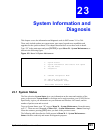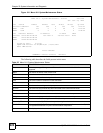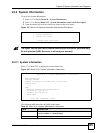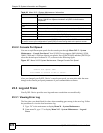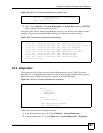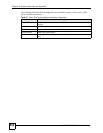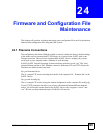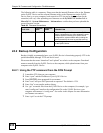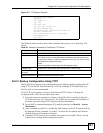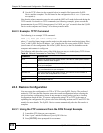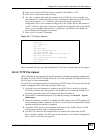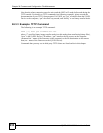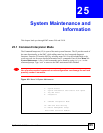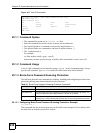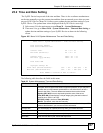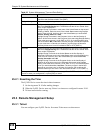
Chapter 24 Firmware and Configuration File Maintenance
ZyXEL NWA-3160 Series User’s Guide
231
Figure 161 FTP Session Example
The following table describes some of the commands that you may see in third party FTP
clients.
24.2.2 Backup Configuration Using TFTP
The ZyXEL Device supports the up/downloading of the firmware and the configuration file
using TFTP (Trivial File Transfer Protocol) over LAN. Although TFTP should work over
WAN as well, it is not recommended.
To use TFTP, your computer must have both telnet and TFTP clients. To backup the
configuration file, follow the procedure shown next:
1 Use telnet from your computer to connect to the ZyXEL Device and log in. Because
TFTP does not have any security checks, the ZyXEL Device records the IP address of
the telnet client and accepts TFTP requests only from this address.
2 Put the SMT in command interpreter (CI) mode by entering 8 in Menu 24 – System
Maintenance.
3 Enter command “sys stdio 0” to disable the SMT timeout, so the TFTP transfer will not
be interrupted. Enter command “sys stdio 5” to restore the five-minute SMT timeout
(default) when the file transfer is complete.
4 Launch the TFTP client on your computer and connect to the ZyXEL Device. Set the
transfer mode to binary before starting data transfer.
331 Enter PASS command
Password:
230 Logged in
ftp> bin
200 Type I OK
ftp> get rom-0 zyxel.rom
200 Port command okay
150 Opening data connection for STOR ras
226 File received OK
ftp: 327680 bytes sent in 1.10Seconds
297.89Kbytes/sec.
ftp> quit
Table 89 General Commands for Third Party FTP Clients
COMMAND DESCRIPTION
Host Address Enter the address of the host server.
Login Type Anonymous.
This is when a user I.D. and password is automatically supplied to the server
for anonymous access. Anonymous logins will work only if your ISP or service
administrator has enabled this option.
Normal.
The server requires a unique User ID and Password to login.
Transfer Type Transfer files in either ASCII (plain text format) or in binary mode.
Initial Remote
Directory
Specify the default remote directory (path).
Initial Local Directory Specify the default local directory (path).



